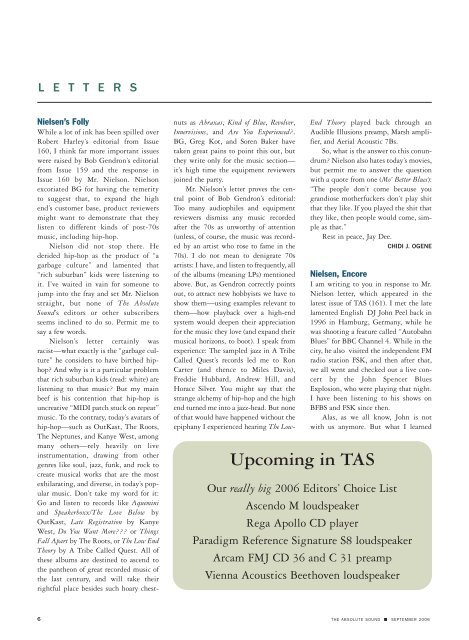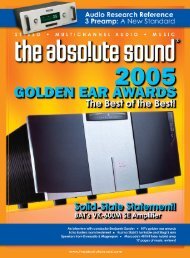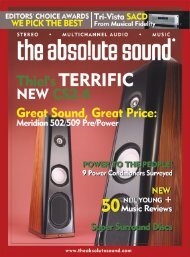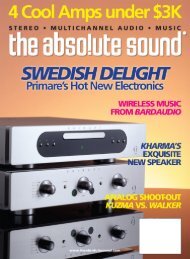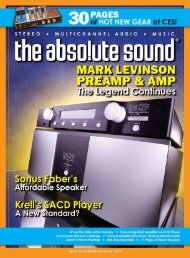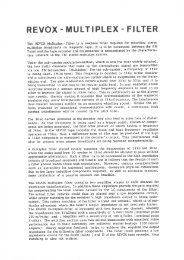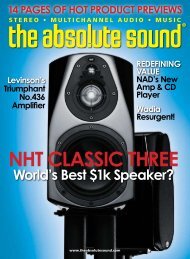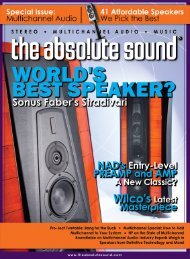The Cutting Edge
The Cutting Edge
The Cutting Edge
Create successful ePaper yourself
Turn your PDF publications into a flip-book with our unique Google optimized e-Paper software.
L E T T E R S<br />
Nielsen’s Folly<br />
While a lot of ink has been spilled over<br />
Robert Harley’s editorial from Issue<br />
160, I think far more important issues<br />
were raised by Bob Gendron’s editorial<br />
from Issue 159 and the response in<br />
Issue 160 by Mr. Nielson. Nielson<br />
excoriated BG for having the temerity<br />
to suggest that, to expand the high<br />
end’s customer base, product reviewers<br />
might want to demonstrate that they<br />
listen to different kinds of post-70s<br />
music, including hip-hop.<br />
Nielson did not stop there. He<br />
derided hip-hop as the product of “a<br />
garbage culture” and lamented that<br />
“rich suburban” kids were listening to<br />
it. I’ve waited in vain for someone to<br />
jump into the fray and set Mr. Nielson<br />
straight, but none of <strong>The</strong> Absolute<br />
Sound’s editors or other subscribers<br />
seems inclined to do so. Permit me to<br />
say a few words.<br />
Nielson’s letter certainly was<br />
racist—what exactly is the “garbage culture”<br />
he considers to have birthed hiphop<br />
And why is it a particular problem<br />
that rich suburban kids (read: white) are<br />
listening to that music But my main<br />
beef is his contention that hip-hop is<br />
uncreative “MIDI patch stuck on repeat”<br />
music. To the contrary, today’s avatars of<br />
hip-hop—such as OutKast, <strong>The</strong> Roots,<br />
<strong>The</strong> Neptunes, and Kanye West, among<br />
many others—rely heavily on live<br />
instrumentation, drawing from other<br />
genres like soul, jazz, funk, and rock to<br />
create musical works that are the most<br />
exhilarating, and diverse, in today’s popular<br />
music. Don’t take my word for it:<br />
Go and listen to records like Aquemini<br />
and Speakerboxx/<strong>The</strong> Love Below by<br />
OutKast, Late Registration by Kanye<br />
West, Do You Want More or Things<br />
Fall Apart by <strong>The</strong> Roots, or <strong>The</strong> Low End<br />
<strong>The</strong>ory by A Tribe Called Quest. All of<br />
these albums are destined to ascend to<br />
the pantheon of great recorded music of<br />
the last century, and will take their<br />
rightful place besides such hoary chestnuts<br />
as Abraxas, Kind of Blue, Revolver,<br />
Innervisions, and Are You Experienced.<br />
BG, Greg Kot, and Soren Baker have<br />
taken great pains to point this out, but<br />
they write only for the music section—<br />
it’s high time the equipment reviewers<br />
joined the party.<br />
Mr. Nielson’s letter proves the central<br />
point of Bob Gendron’s editorial:<br />
Too many audiophiles and equipment<br />
reviewers dismiss any music recorded<br />
after the 70s as unworthy of attention<br />
(unless, of course, the music was recorded<br />
by an artist who rose to fame in the<br />
70s). I do not mean to denigrate 70s<br />
artists: I have, and listen to frequently, all<br />
of the albums (meaning LPs) mentioned<br />
above. But, as Gendron correctly points<br />
out, to attract new hobbyists we have to<br />
show them—using examples relevant to<br />
them—how playback over a high-end<br />
system would deepen their appreciation<br />
for the music they love (and expand their<br />
musical horizons, to boot). I speak from<br />
experience: <strong>The</strong> sampled jazz in A Tribe<br />
Called Quest’s records led me to Ron<br />
Carter (and thence to Miles Davis),<br />
Freddie Hubbard, Andrew Hill, and<br />
Horace Silver. You might say that the<br />
strange alchemy of hip-hop and the high<br />
end turned me into a jazz-head. But none<br />
of that would have happened without the<br />
epiphany I experienced hearing <strong>The</strong> Low-<br />
End <strong>The</strong>ory played back through an<br />
Audible Illusions preamp, Marsh amplifier,<br />
and Aerial Acoustic 7Bs.<br />
So, what is the answer to this conundrum<br />
Nielson also hates today’s movies,<br />
but permit me to answer the question<br />
with a quote from one (Mo’ Better Blues):<br />
“<strong>The</strong> people don’t come because you<br />
grandiose motherfuckers don’t play shit<br />
that they like. If you played the shit that<br />
they like, then people would come, simple<br />
as that.”<br />
Rest in peace, Jay Dee.<br />
CHIDI J. OGENE<br />
Nielsen, Encore<br />
I am writing to you in response to Mr.<br />
Nielson letter, which appeared in the<br />
latest issue of TAS (161). I met the late<br />
lamented English DJ John Peel back in<br />
1996 in Hamburg, Germany, while he<br />
was shooting a feature called “Autobahn<br />
Blues” for BBC Channel 4. While in the<br />
city, he also visited the independent FM<br />
radio station FSK, and then after that,<br />
we all went and checked out a live concert<br />
by the John Spencer Blues<br />
Explosion, who were playing that night.<br />
I have been listening to his shows on<br />
BFBS and FSK since then.<br />
Alas, as we all know, John is not<br />
with us anymore. But what I learned<br />
Upcoming in TAS<br />
Our really big 2006 Editors’ Choice List<br />
Ascendo M loudspeaker<br />
Rega Apollo CD player<br />
Paradigm Reference Signature S8 loudspeaker<br />
Arcam FMJ CD 36 and C 31 preamp<br />
Vienna Acoustics Beethoven loudspeaker<br />
6 THE ABSOLUTE SOUND ■ SEPTEMBER 2006


